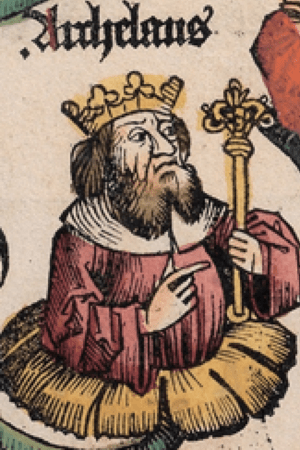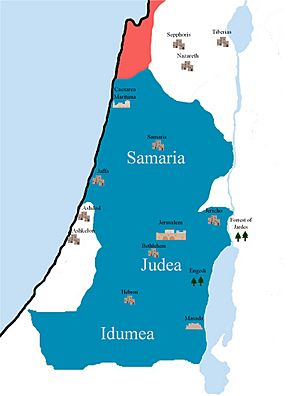Herod Archelaus facts for kids
Quick facts for kids Herod Archelaus |
|
|---|---|
| Tetrarch | |

Herod Archelaus, in the 1493 Nuremberg Chronicle
|
|
| Reign | 4 BC – AD 6 |
| Predecessor | Herod the Great |
| Dynasty | Herodian Dynasty |
| Father | Herod the Great |
Herod Archelaus (born around 23 BC, died around AD 18) was a ruler in ancient times. He was the son of Herod the Great and Malthace. Archelaus ruled over a large area that included Samaria, Judea, and Idumea. This area also had important cities like Caesarea and Jaffa.
He ruled for about nine years, from 4 BC to AD 6. His title was ethnarch, which means "ruler of an ethnic group". This was a step below being a king. The Roman emperor Augustus later removed Archelaus from power. This happened when Judea became a direct Roman province, around the time of the Census of Quirinius.
Contents
Herod Archelaus's Early Rule
When his father, King Herod the Great, was dying in Jericho, there was a big problem. Herod had put a golden eagle statue over the entrance of the Temple. Many people saw this as disrespectful to their religion. Some brave teachers and about 40 young people took down the eagle. They were arrested and sadly, executed for this act.
After his father's death, Archelaus wanted to keep the peace. He dressed in white and sat on a golden throne in Jerusalem. He tried to be kind to the people. They asked for lower taxes and for Herod's political prisoners to be freed. The crowd also wanted a new High Priest, someone more religious and pure.
Archelaus agreed to some of their requests. But he started to get annoyed by their demands. He asked them to be patient and wait until Emperor Caesar Augustus officially made him king.
Trouble in Jerusalem
Archelaus then left to have a meal with his friends. As evening came, a loud crying and mourning started in the city. People were gathering near the Temple. They were still very upset about the teachers and youths who had been executed.
Archelaus became worried. He sent a general and other officials to try and calm the crowd. He asked them to stop their protests and wait for his return from Rome. But many of Archelaus's messengers were killed by the angry crowd.
Because of this, Archelaus ordered his entire army into the city. About 3,000 people were killed. Archelaus then announced that the Passover festival was cancelled.
Journey to Rome and Emperor Augustus's Decision
Archelaus quickly sailed to Rome to meet Emperor Augustus. He faced many challenges there, even from his own family. His younger brother, Antipas, argued against Archelaus. Antipas claimed Archelaus only pretended to be sad for their father. He said Archelaus cried during the day but had parties at night.
Antipas also argued that Archelaus had acted like a king before Augustus had given him the title. He pointed out that Archelaus's actions, like killing 3,000 people at the Temple, were a threat to Augustus himself.
However, a man named Nicolaus of Damascus, who was Herod the Great's trusted advisor, spoke up for Archelaus. He told Augustus that Archelaus had acted correctly. He also said that Herod's last will, which named Archelaus as king, was valid. This will was supposedly written just weeks before Herod died. Nicolaus argued that Herod was clear-headed when he made this decision.
After hearing all the arguments, Archelaus knelt before Augustus. The Emperor helped him up and said that Archelaus "was worthy to succeed his father." Augustus did not make him king, but he gave Archelaus the title of ethnarch. He also divided Herod's kingdom. Archelaus received the largest part: Samaria, Judea, and Idumea.
Archelaus's Later Years and Removal
Archelaus's first wife was named Mariamne. However, he divorced her to marry Glaphyra. Glaphyra was the widow of Archelaus's brother, Alexander. This marriage was seen as wrong by many people.
Archelaus also continued to be very strict and sometimes cruel. The people he ruled over became very unhappy with him. They complained to Emperor Augustus about his behavior.
Because of these complaints and his actions, Archelaus lost favor with Augustus. In his tenth year as ethnarch, he was removed from power. He was sent away to Vienna in Gaul (modern-day France). After his removal, Samaria, Judea, and Idumea became a direct Roman province called Judaea.
See also
 In Spanish: Herodes Arquelao para niños
In Spanish: Herodes Arquelao para niños
- Herodian dynasty
- Herodian kingdom
- List of biblical figures identified in extra-biblical sources
 | Aurelia Browder |
 | Nannie Helen Burroughs |
 | Michelle Alexander |


